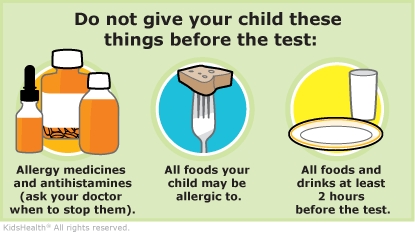Egg Challenge Test: How to Prepare Your Child
An egg challenge is a test used to find out if a person is allergic to eggs. Your child will have an egg challenge test because recent skin test and blood test results show that your child may no longer be allergic to eggs.
During the egg challenge test, your child will eat very small amounts of egg and be closely watched while eating increasing amounts. If your child has an allergic reaction, it will be treated as needed. The reaction symptoms might be mild (such as a rash or itching) or more severe (such as vomiting or trouble breathing). If your child eats a full portion of eggs with no allergic reaction, it means that your child is not allergic to eggs. After the test, your health care provider will let you know if you should make any changes to your child's diet.


-
Schedule the challenge appointment as soon as possible. Often, skin test and blood test results can be used to recommend an egg challenge for only 6 months.
-
The office will tell you how many days before the test to stop giving your child any allergy medicines, such as antihistamines (such as Benadryl®, Claritin®, and Zyrtec®) and some nose sprays (such as Astelin®, Astepro®, and Patanase®). Some cough and cold medicines also contain antihistamines and should not be given.
-
Ask if you should stop any of your child's other regular medicines before the test.
-
On the day of the egg challenge test:
-
Bring all foods as you have been instructed. Usually, it is best to bring a hard-boiled egg, a scrambled egg, and French toast made with egg. This way, if your child does not like one, another can be tried. All these foods must be made with an extra-large or jumbo egg. Follow any specific instructions you got about how to prepare the foods.
-
Bring any toppings that your child is not allergic to and might like with these foods, such as crackers, ketchup, seasonings, or syrup.
-
Bring your child's epinephrine auto-injectors to the appointment.
-
Your child should not have anything to eat or drink for at least 2 hours before the challenge.
-
If your child's appointment is in the morning, do not give breakfast the morning of the challenge.
-
Bring an extra change of clothes for you and your child in case your child vomits during the challenge.
-
Bring books, toys, and/or games to keep your child busy during the test, especially during the waiting times.
-
Stay calm during the test to help keep your child relaxed as well.

-
Your child is ill (even with just a cold), or has an allergic reaction, an asthma flare-up, or an eczema flare-up in the 7 days before the egg challenge test.
-
You gave your child any allergy medicine in the 7 days before the test.
-
You're not sure whether your child should stop taking a medicine before the egg challenge test.
-
Your child needs asthma quick-relief medicine the day of the test.

How long does an egg challenge test take? The challenge can take several hours because the amount of egg is increased slowly. Your child will be carefully watched after eating each amount.